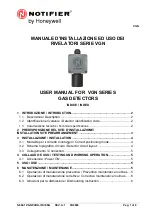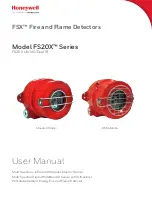
OWNER’S MANUAL
Please read before using this equipment.
www.radioshack.com
SM
SAFETY ALERT SYSTEM
The Safety Alert System employs low-powered
transmitters used by some emergency services and
road crews to alert drivers to hazardous road
conditions. The system can indicate stationary,
moving, or railroad hazards.
The system has the potential to dramatically
decrease the occurrence of traffic accidents by
increasing drivers’ awareness of local road hazards.
Having this safety alert compatible radar/laser
detector will ensure that you are ready to benefit from
this system wherever it is in use.
D
ASHBOARD
M
OUNTING
In some vehicles, the dashboard may be the best location to
mount the detector. Use the supplied hook-and-loop tape to
mount your radar detector to the dash.
1. Use a damp cloth to clean the bottom of the detector and the
dashboard. Let both surfaces dry.
2. Remove the tape’s paper backing and
stick the tape to the bottom of the
detector.
3. Remove the backing from the other
side of the tape and firmly press your
detector onto the dashboard.
Thank you for purchasing a RadioShack Radar
Detector with Safety Alert. Your radar detector
can alert you to many traffic radar and laser
systems with its distinct visual and audio alerts.
It receives X-, K-, and Ka-band radar signals,
and detects both the instant-on and laser
systems many law enforcement agencies use to
measure vehicle speed. Plus, your detector can
give you advance warning of potential road
hazards by detecting signals from transmitters that
broadcast Safety Alert System™ alerts.
Radar Detector
with Safety Alert
22-1695
PACKAGE CONTENTS
Ô
Dashboard Mounting Notes
Ô
• The tape’s adhesive might not stick to a surface treated with vinyl
cleaner or protectant.
• Do not place the hook-and-loop tape over the detector’s serial
number.
• On a curved dashboard, cut the supplied strip in half and use one
strip on each side of the bottom of the detector.
• Be sure to place the detector out of view when you leave the
vehicle. This keeps the detector out of sight of thieves and prevents
exposure to extremely high temperatures, which can temporarily
impair your detector’s performance.
Ô
Note
Ô
Before reading this Owner’s Manual, read the supplied
booklet Questions and Answers About Vehicle Speed
Detection to familiarize yourself with the terms and uses
associated with your detector.
S
ELECTING
A
M
OUNTING
L
OCATION
For the best performance, select a location where the
detector has a direct view of the road. The detector’s
radar antenna is at the opposite end of the indicators.
Mounting Guidelines
• Choose a location
that does not block
the driver’s view of
the road.
• Mount the detector
in a level position
with a clear view of
both the front and rear of your vehicle.
• Choose a location that gives the detector a view
unobstructed by metal objects.
• Some vehicles have InstaClear
®
or ElectriClear
®
defogging windshields, which
have metal coatings that block signals. Check your vehicle’s owner’s manual to
see if your vehicle has one of these features. A detector installed in a vehicle
with one of these features might not detect a signal.
• Since window tinting reduces the received strength of laser signals, you should
not mount the detector behind any tinted glass.
• Do not mount the detector where the driver or a passenger might hit it in a sudden
stop or accident.
W
INDSHIELD
M
OUNTING
1. Clean the selected windshield area,
position the bracket on the windshield,
and press firmly on each suction cup to
secure the bracket.
2. Slide the detector’s bracket slot onto
the bracket until it snaps into place.
CAUTION
Do not use the mounting
bracket in a vehicle that
has a plastic safety
coating on the inside of
the windshield designed
to protect passengers
during an accident. If you
use the bracket on this
type of windshield, you
might permanently mar
the windshield’s surface.
Mount the radar detector
on the dashboard
instead.
Ô
Note
Ô
Though the detector has a
360° laser and radar detection
range, the radar detection is
most sensitive in the front
range.
Questions and Answers About
Vehicle Speed Detection Booklet
Hook and
Loop Tape
Windshield
Bracket with
Suction Cups
Radar Detector
Coiled Power Cord
Adjusting the Bracket
If the mounted detector is not at the optimum
viewing angle, you can adjust the mounting
bracket for better viewing. Carefully bend the
bracket to adjust it to the desired angle.
Bracket Slot
Plug the supplied power cord’s
barrel plug into the detector’s
12V DC jack. Then plug the cord’s
cigarette-lighter plug into your
vehicle’s cigarette-lighter socket.
CAUTION
• Use only the supplied 12V DC,
Positive (+) Tip power cord. Use of
any other power source may cause
damage.
• Before plugging the power cord’s
cigarette-lighter plug into your
vehicle’s cigarette-lighter socket,
make sure the plug’s tip is screwed
firmly onto the plug.
Ô
Note
Ô
• To prevent the detector from draining
your vehicle’s battery if you leave the
detector on when you turn off the
ignition, unplug the power cord from
your vehicle’s cigarette lighter socket.
• If the detector does not operate when
you turn it on, remove the cigarette-
lighter plug from your vehicle’s socket
and check the socket for debris. Also,
check the fuse in the detector’s plug
and your vehicle’s cigarette lighter
fuse.
12V DC Jack
360° Laser Eye — receives
incoming laser signals
directed at your vehicle from
all directions.
Dim — controls the
brightness of the
indicators
Mute — silences the
alert tone.
City (City/Highway) —
switches between city
and highway modes.
VG-2
VOLUME/OFF — turns the
detector on and off and lets
you adjust the volume.
Indicators
VG-2 — lights when a VG-2 signal is detected.
C (City) — lights when the detector is in city mode.
O (Moving Train) — both indicators under O (M and
S) flash when the detector encounters a signal related
to a moving train from a safety alert transmitter.
• M (Emergency Vehicle) — flashes when the
detector encounters a signal related to an
emergency vehicle from a safety alert transmitter.
• S (Stationary Road Hazard Situation) — flashes
when the detector encounters a signal related to a
stationary road hazard from a safety alert
transmitter.
2 and 3 — signal strength indicators that flash to
provide a visual indication of the strength of received
radar signals.
L (Laser) — both indicators under L (X and K/Ka)
flash when the detector encounters a laser signal.
• X (X-Band Radar) — displays when the detector
encounters an X-band radar signal.
• K/Ka (K/Ka Band Radar) — flashes when the
detector encounters either a K- or Ka-band radar
signal.
P (Power) — lights when the detector iis turned on.
CONTROLS & INDICATORS
C
O
M
S
3
L
2
X
K/Ka
P
INSTALLATION
ARE RADAR DETECTORS
LEGAL?
Federal law lets you install and use a radar
detector in automobiles and light trucks under
10,000 pounds in the United States. Presently,
Virginia and the District of Columbia have some
laws regulating or prohibiting the use of radar
detectors in all vehicles.
CONNECTING POWER
OPERATION
TURNING ON THE DETECTOR
To turn on the
detector, rotate
VOLUME/OFF
toward VOLUME
until it clicks.
After self-testing,
the P (power)
indicator lights.
To turn off the detector, rotate VOLUME/OFF toward OFF until it
clicks and all the LEDs turn off.
ADJUSTING THE VOLUME
Rotate VOLUME/OFF toward VOLUME to increase the
detector’s volume, rotate it toward OFF to reduce the volume.
OPERATION SETTINGS
S
ELECTING
C
ITY
AND
H
IGHWAY
M
ODES
Your detector has two
operating modes: City and
Highway.
• City mode requires a
stronger X-band signal
before the detector
sounds, or visually
indicates, an alert.
• Highway mode provides
maximum sensitivity for
open-road driving. The detector is preset to Highway
mode when you turn it on.
1. To select City mode, press City. The C LED lights.
2. To return to Highway mode, press City again. The C LED
turns off.
Ô
Note
Ô
• City mode helps prevent
false alerts in tightly
populated areas where laser/
radar signals can bounce off
surrounding structures.
• City mode has no effect on K
or Ka-band signals or laser
alerts or instant-on radar.
VOLUME/OFF
22-1695.fm Page 1 Tuesday, April 1, 2003 9:20 AM



















